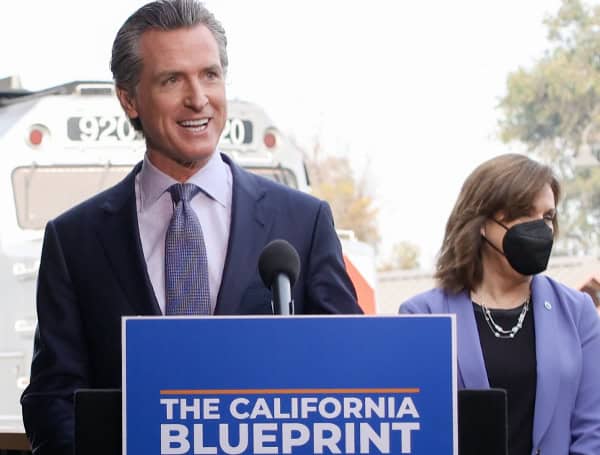Power outages amid the ongoing wildfires in California have stoked fears among electric vehicle (EV) owners that they could be unable to power their cars in an evacuation scenario.
Despite President Joe Biden and Democratic California Gov. Gavin Newsom’s push to increase EV adoption, many Americans have remained reluctant to purchase the vehicles, often citing “range anxiety” — the concern among drivers that they will run out of charge before reaching their destination or a charging station. Now, with more than 100,000 evacuations and widespread power outages due to the ongoing infernos, California EV owners have expressed fears their electric cars could threaten their ability to escape the fires, according to the Los Angeles Times.
READ: Alabama Sen. Tuberville Demands ‘Stipulations’ On California Wildfire Aid
A gasoline car “can evacuate in any direction on any road and still get fuel when needed,” Matthew Butterick, a Los Angeles attorney who lives near Griffith Park, told the Times. “The EV stations on evacuation routes would have massive lines and delays, gasoline stations less so. And the electric grid may not be available. Power companies turn off power to avoid sparking a fire and also to avoid legal liability. This is probably the future of all the hillside neighborhoods.”
Val Cipollone, a Berkeley resident who owns a fully electric Nissan Leaf, shared similar concerns as Butterick with the Times: “Who knows how far you’d have to drive [after a disaster]. I used to think I’d only need to drive to my place of work. But who knows, I might have to go much farther.”
READ: Los Angeles Wildfires: Death Toll Rises, Containment Progresses As Red Flag Warnings Persist
Cipollone now plans to swap her EV for a hybrid, according to the Times.
California led the U.S. in EV adoption in 2023, with 1.1 million EVs and the highest number of EVs per capita at 3,026 per 100,000 people. Washington, the state with the second EV adoption, trailed California by over 40% on a per capita basis, with 1,805 EVs per 100,000 people.
The Biden administration has spearheaded a push for EV adoption, providing a $7,500 tax credit and tens of billions in subsidies for automakers to retrofit their factories to accommodate EV production. The White House also introduced stringent tailpipe emissions standards, effectively requiring about 67% of all light-duty vehicles sold after model year 2032 to be electric vehicles (EVs) or hybrids.
Newsom’s administration has also supported efforts to boost EV adoption, with the California Air Resources Board (CARB) in December prohibiting the sale of new gas-powered cars in the state by 2035.
CARB had also requested a waiver from the federal Environmental Protection Agency that would have allowed the state to require 100% of the state’s truck fleet move to zero-emission models starting in 2024, ending with the fleet going 100% zero-emissions between 2035 and 2042. However, California regulators withdrew the request Wednesday.
READ: CNN Panel Has Fiery Exchange After Scott Jennings Backs ‘Conditions’ On Wildfire Aid
Despite the strict regulation and subsidies, EV demand has slackened over the last year, with sales growing by just 31% in the first half of 2024, down from 50% in the first half of 2023 and 71% increase in the first half of 2022. Additionally, a June poll from The Associated Press-NORC Center for Public Affairs Research and the University of Chicago’s Energy Policy Institute found 46% of respondents were “unlikely” or “very unlikely” to purchase an EV, while just 21% were “very” or “extremely” likely to make the change.
“Even after throwing money at EVs hand over fist, basically paying people tax dollars to drive these cars off the lots, you have a dire spiral of (1) not enough demand to support the number of cars being produced, and (2) the people you paid to buy them now wanting to go back to what they had before,” O.H. Skinner, executive director of the Alliance for Consumers and the former solicitor general of Arizona, previously told the DCNF.
Governor Newsom’s office did not immediately respond to a request for comment.
Please make a small donation to the Tampa Free Press to help sustain independent journalism. Your contribution enables us to continue delivering high-quality, local, and national news coverage.
Connect with us: Follow the Tampa Free Press on Facebook and Twitter for breaking news and updates.
Sign up: Subscribe to our free newsletter for a curated selection of top stories delivered straight to your inbox.

First published by the Daily Caller News Foundation.

